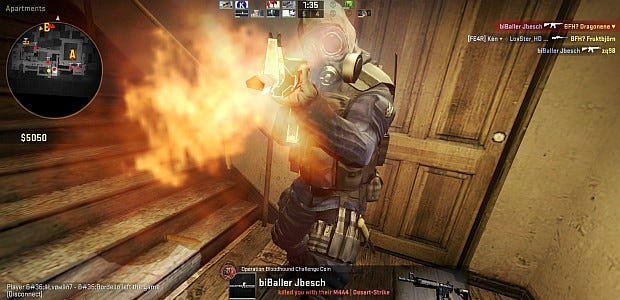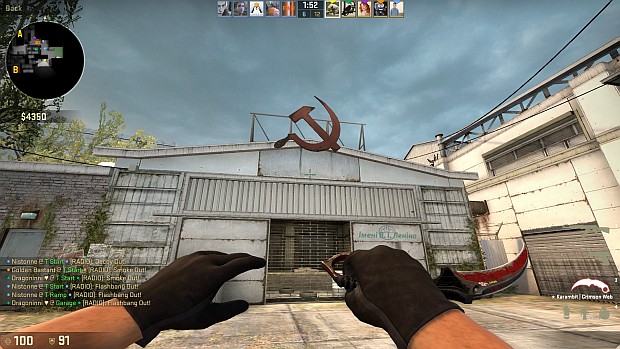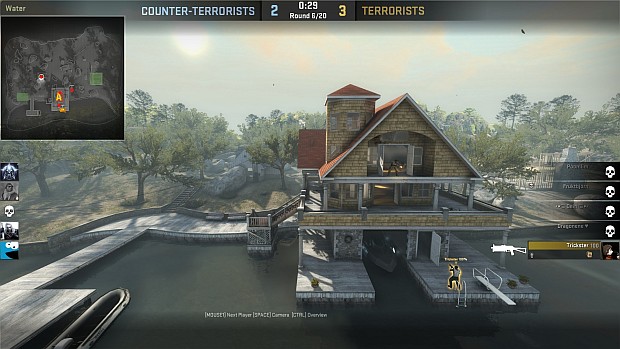Globally Offensive: Let's Talk About Abuse in CS:GO
Pop Flash #2
In Pop Flash, a series of insights into Counter-Strike: Global Offensive [official site], Emily Richardson looks past the amazing clutches and crushing defeats to understand the culture and meta of Valve’s everlasting competitive FPS.
This week, I’ll be discussing abuse and toxic behaviour in the CS:GO community. Before we get to it, let me reiterate that I am madly in love with Counter-Strike. It’s simply one of the best team games out there. This piece, however, is meant to highlight one important issue that I think we can overcome.
Abuse in online games is a huge problem. We already know this; we’ve done studies on the effects of anonymity both online and in the real world, we’ve seen Riot’s research into the abuse of the League of Legends community, and we’ve all heard our share of profanities in-game. But why do people flame? In an attempt to figure out if we can improve our community, and if other players even want it to improve, I started thinking about what compels us to get abusive.
To begin, I decided to simply ask: what compels you to flame or abuse others? I brought this question directly to players in-game, in the CS:GO subreddit, and on Twitter. Perhaps, I thought, there's nobody better to answer than those who flame themselves.
First, I tried asking during matches. I’m one of those people who usually only plays in stacks of four or five to avoid abusive teammates, especially when, as a woman, I attract a good amount of bullshit. Naturally, this venture was a terrifying foray into the minds of my abusers.
“Hello,” I said, tentatively joining a casual game at first. I was met with a volley of responses in a Slavic language. I soon realised they were several people talking to each other, loudly, maybe even… angrily? I politely asked if they spoke any English.
“Fuck you,” they said with a heavy accent.
“That’s great, thanks.”
“Fuck you,” they said again.
“Yep, got that.”
“Fuck you.”
“Okay,” I said, “keep arguing, that’s good.”
Then came more of the unfamiliar language.
“I’m sorry, what was that?”
“He say you gay,” one of them replied.
“Great!”
I didn’t get anything else out of them. I learned absolutely nothing about anything. I tried again in competitive games but the result was more or less the same; someone would be a jerk, they’d scream at their teammates and I’d carefully and honestly ask them to explain their logic. There’d be a long, contemplative silence and nothing else. If I was lucky I might get another ‘fuck you’. Notably, most of the abuse stopped immediately after I’d asked for their reasoning. Interesting!
Next, I went to Reddit. One user was adamant that the block and report system had already fixed the issue, but I just can’t bring myself to agree. Blocking is obviously the best tool for getting rid of harassers, but in a game that depends so highly on communication it just sucks to have to block somebody. And it doesn’t stop them abusing you in the first place. If someone throws one of those incredibly original gendered insults at me, no matter how fast I block and report them, I’m still really annoyed about it.
When I asked people outside of the game why they flame, the response was usually the same - it’s either some kind of retaliation against other people flaming them or frustration with people ‘not playing the game properly’. No one is willing to admit that they flame or abuse before anyone else has said or done something negative (apart from one Reddit user, who declared, “Honestly, I hate people and it's fun to troll bait”).
I wasn't expecting everyone to give thoughtful, honest answers to my questions; trolls hide behind anonymity and an in-game persona and won’t readily expose themselves to scrutiny. However, these responses make me wonder; do a lot of flamers honestly think they’re merely retaliating or defending themselves in some way?
Twitter user Daniel Mudd openly admits to flaming teammates but still has the humility to evaluate it. “I get so horrendously toxic,” he told me. “It's alarmingly common, and very odd that it happens.” I asked him what compels him to get this way. Is it a means of getting what he wants from his teammates, frustration with the game or just plain nastiness? “I don't flame or get mad to put people down, it's out of sheer frustration,” he explained. “I generally don't get abusive and try not to directly insult people, I just get really annoyed, criticise their gameplay, end up back-seating them and start to ignore them. [I] play in ways that don't benefit them, such as having no issues baiting them or not making calls that would aid them.”
Is it possible that the game’s very design - one life per round, the importance of communication, friendly fire, etc. - exacerbates such behaviour? When asked, Mudd said, “I think one of the big things that frustrates me is the team-dependant nature of the game. No matter how well I play on a personal level, if another player on the team isn't playing up to standard or making stupid decisions, it can get me killed and hinder the entire team.
“This ties in with the nature of the game - because someone was screwing around and not holding an angle or AFKing or doing goodness-knows-what, you then have to sit for two minutes and continue to watch the person who got you killed. No one likes dying, and dying for something that was the responsibility of another player gets to people generally.”
I asked if Daniel ever resorted to team-killing, team-flashing or purposefully feeding to retaliate, as so many flamers often do. “Griefing using the game mechanics tends to be a huge no-no for me. I aim to play CS:GO the best I can personally, and abusing game mechanics to do this isn't beneficial to personal performance and generally detracts more from team performance.”
Personally, I find any kind of flaming detracts from team performance. Everyone is too busy grumpin’ and loses their focus. Eventually, I start to feel that the offending teammate doesn’t deserve a win anyway, and I end up playing dangerously for careless thrills instead of diligently trying my best to win. I suspect many flamers know this happens, but they’re still aggravated enough to throw a match in this way.
Another important factor in player behaviour is anonymity. In 1976, Edward Diener presented his famous Halloween study demonstrating how children are much more likely to steal when they’re anonymous and have a reduced sense of responsibility.
The study was connected to the concept of deindividuation, a theory that went some way to explain the violent and impulsive behaviour of individuals in large crowds and mobs. The first to put forward the idea that anonymity was a key factor in deindividuation was Leon Festinger (1952). Obviously, violent crowds and lynch mobs are a far more serious case study, but the concept of deindividuation has, in recent years, been assessed in volatile players online. The anonymity that usernames grant us combined with the reduced sense of responsibility - perhaps relating to the notion that we’re retaliating or justified in our actions because of the way another player behaved - could explain in part why competitive gamers frequently turn into asshats.
A second study, conducted by Philip Zimbardo, amended the famous Milgram’s Shock Experiment and added an anonymity variant. One group of people wore name tags and their regular clothing while administering electric shocks to a woman, while the second wore a hood and had no other identifying features. The second group applied longer electric shocks, thus demonstrating that we’re more willing to engage in anti-social behaviour if not identified. This doesn’t necessarily translate directly to Counter-Strike’s abuse problem - there are a lot of discrepancies - but it’s interesting to think about.
Of course, removing the systems that give us anonymity online has its own risks and I’m not arguing for that. Being anonymous means I can choose to use a gender-neutral alias and play the game. It means racial and other minorities can do the same. In this sense, anonymity is a double-edged sword. Some companies, like Riot, have gone to great lengths to reward positive behaviour and enforce their policies while still maintaining anonymity and player security - something I think Valve could learn from.
Language could be another major factor in the flame wars of Counter-Strike. About a year ago, I moved to Sweden, and awkward dinner parties have made it quite apparent I ought to learn the language. Unfortunately, Swedish is intentionally designed to make foreigners say rude words by sliiiiightly mispronouncing certain vowel sounds. Not that it really matters, because I started by learning useful words like ‘poo’.
Now, being the mature person that I am, whenever I come across a Swede in CS I usually manage to subdue to the rising desire to copy and paste the word poo into the chat a hundred times. On the rare occasion, though, it slips out. Sometimes other things slip out. Sometimes I accidentally call someone a poo-mouth or a butt-cheese. Sometimes my inventive terminology ends up being more offensive than I understand it to be.
Psychologists at the University of Chicago have studied how language affects our decisions. In the research, they found that bilingual people were more emotionally connected to their native language. When asked a question in their second language, people are generally more likely to make a more rational, logical and utilitarian decision. If asked in their native language, people are more likely to be affected by emotional expectations and have a harder time detaching themselves from emotional biases. Somehow, our differing perceptions of and connections to language change how we perceive and evaluate situations.
I think about language specifically because, despite not necessarily fully comprehending the degree to which I’m being offensive or not, I struggle to take what I’m saying in Swedish seriously. I’m so bogged down by all the unfathomable sentence structure, ridiculous spellings and the curious phenomenon of “särskrivning” that if I actually manage to give an insult successfully it is an impressive and hilarious feat. I’m completely detached from whatever I’m saying. A Swedish person can attack me in Swedish and I’ll still manage to be a bit miffed about it, but if I’m the one writing it, it somehow seems less offensive. I simply have no emotional or historical connection with any of the words or their meanings.
On the other hand, we have people who can actually be understood but still don’t fully understand social connotations or how offensive a word is. One redditor I spoke to put it well: “There appears to be two reasons for so much flaming if English is your second language. 1. You are somewhat detached from the words’ social meanings (for example they may just use the ’n-word’ without knowledge of its history). 2. You do not speak the language well enough to provide constructive criticism, so you resort to flaming when someone does something wrong.”
The second point is very relevant. To what degree do language barriers add fuel to the flames? Honestly, I don’t know. I wouldn’t even know how to start measuring it, but how cultural differences affect us and how we give and take offence is part of figuring out why the flamers flame.
Toxicity in Counter-Strike’s matchmaking also causes other issues. It could make new players leave the game before finding any of the wonderful, close-knit communities that many experienced players tend to cluster around. Finding a way to encourage exploration and creative collaboration would make the game better for everyone. Something like Natural Selection 2’s ‘noob-friendly’ servers might serve as a more welcoming entry point for beginners. This could be especially beneficial for women, who frequently quit or avoid competitive games due to frequent harassment.
CS:GO is due for an interface makeover and this seems an apt opportunity to add new community-nurturing features. Although the report and commendation features are in place, there’s very little incentive beyond goodwill for players to actually use them or care about their stats.
If Valve did this, what would you want to see? What do you think would benefit us in terms of community? And perhaps most importantly - is it ‘sneaky peeky-like’ or ‘sneaky beaky-like’? Please leave your thoughts below.









